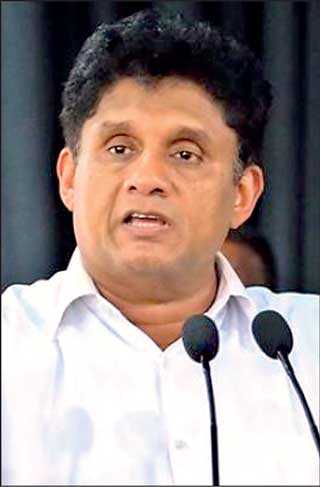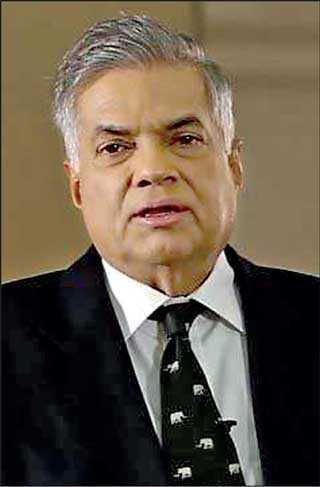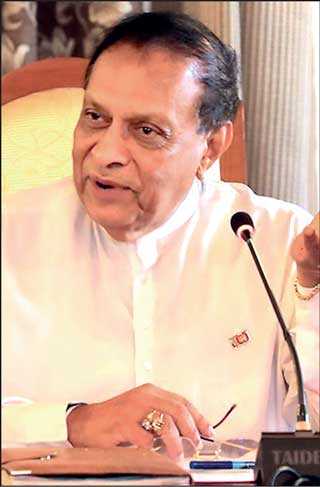Thursday Feb 26, 2026
Thursday Feb 26, 2026
Wednesday, 13 January 2021 00:00 - - {{hitsCtrl.values.hits}}
By Harindra B. Dassanayake
 |
| Sajith Premadasa
|
 |
| Ranil Wickremesinghe
|
 |
| Karu Jayasuriya
|
It was a double bonus to see Dr. Dayan Jayatilleka’s response to me on 1 January when I picked up Daily FT in the morning.
First, he had responded to me in a matter of two days, and that is a favour I could not return, regrettably. Second, and more importantly, the title of his reply ‘Saving Sri Lanka’s democracy: A strategic perspective’, signified that I could expect to read some actionable and positive recommendations useful to the progressive camp in the defence and strengthening of democracy in Sri Lanka.
This latter, I trust, is a goal of Dayan Jayatilleka as much as it is of mine. Yet, my positive hopes on the first morning of 2021 could not live long. In his reply’s rhetorically impressive 10 points, except for points I through III, I could hardly find much that justified the title’s promise to outline a strategy rather than a self-centred defence of the precarious balance he has tried to strike at different stages of his career.
Person over idea
This breach between the promise in the title and the disappointment in the content could have been ignored had it not drawn an obvious parallel to what Dr. Jayatilleka has often been doing lately. That is, mistaking the tallest tree(s) for the forest. Simply put, prioritising individual politicians to the political camp. The idea of a camp seems to remain a little distant to him as I will show later in this column.
The ‘person over idea’ bias undergirds his otherwise well-structured response, typical of Dayan. The simplest sign of it is the seeking out for a photo of the writer, eliciting doubts on the authenticity of the person (which I believe is genuine as I have opted not to send my picture to any of my articles to Daily FT at various times and some of my political writing has been published under a pseudonym elsewhere).
Then, the disparity between the complexity that he warrants for his persona and other personalities he chooses to adorn and the caricaturing those who he chooses to undermine strikes out throughout his column. Caricature, that is, describing someone in a way that makes them look silly by making part of their character more noticeable than it really is, knocks on the door of a perilous process leading to stereotyping, dehumanising, and demonising. His arguments would have been more credible had he treated all politicians with due broadness and complexity.
In discourses like these, in the interest of rhetoric finesse, it is easy to go overboard by resorting to polemics, as Dr. Jayatilleka sometimes does. Hence a timeless maxim from Friedrich Nietzsche, “He who fights with monsters might take care lest he thereby becomes a monster. And if you gaze for long into an abyss, the abyss gazes also into you.”
This call for not becoming a monster by fighting one, should, first, be the guiding light to my response to Dr. Jayatilleka. It is important to understand one’s personality in its context rather than in isolation, both that of Dr. Jayatilleka as well as of others. Consider, for instance, Ranil Wickremasinghe almost won a Presidential election in 2005, coming on a completely pro-devolution platform, save for an LTTE-led voting boycott. Despite personal differences or dislikes, a complex historical context cannot be squibbed to a ‘jinx’.
Second, such clarity of ideas is important in the all-important task of re-calibrating the ideological compass of progressive politics. For instance, in Dayan’s words, looking too deeply into ‘the most chauvinist regime in our post-Independence history’, it is important that those who promise to overcome them do not also become chauvinists in the process.
Dayan Jayatilleka recommends that “the SJB must do what SWRD succeeded in doing: create a new, moderate progressive centre and build a new ideological camp around it.” While agreeing with his on most of its content, we would be alarmed if one of the most dangerous games Sri Lankans ever played with the brazen torch of patriotism.
Blindfolded clairvoyance
Dayan’s preoccupation with persons makes him miss the point. For instance, when Dr. Jayatilleka wrote: “Given Harinda B’s article it is very clear who and what he has in mind: either Karu J or a recycling of the nonsensical ‘abolition of the executive presidency’ slogan…”, I wonder what clairvoyance he possessed to see things that I do not have in mind, namely, to bring back the former Speaker, Karu Jayasuriya or to propose the abolition of the executive presidency. I do not believe that the executive presidency is the source of all evil, as long as institutions and systems of democracy are strong.
The reference to Karu Jayasuriya was made in a reality check of the wrong electoral assumptions the UNP-led progressives made in the 2019 Presidential Election, which Dayan Jayatilleka continues to defend even now. His repetition of the same arguments as his previous article on 22 December does not address the ingredients of my response.
My point was that in the choice of a candidate, the progressive camp failed to retain its middle-class votes, where its stronghold remained.
Trying to reach out to the swing votes among the low-income and rural base was wrong, as proven in election results as the expected rural base did not show any positive change while losing the middle-class areas by history’s largest margins. I do not wish to reproduce the same arguments here in the same or different language. Instead, I would show why the idea of camp is important, as it is the camp, and not the person, that defines who will vote for you.
Sri Lanka’s political camps
As this section is going to chart a relatively new idea, I am outlining a very short history of Sri Lanka’s left and right political camps, with apologies for its brevity, while I am sure Dr. Jayatilleka needs no introduction to these.
In many democracies in the world, politics is organised around two broad ideologies. In a clichéd analogy, it’s the right bank and the left bank of a river. These two river banks form broad platforms that represent different worldviews, priorities, ways of doing things, support bases, and slogans, etc. Those on the right, the conservatives are the “the party of the order” and power consolidation, while on the left are the progressives, who are for revolution, equality, change, and democracy.
Independent Ceylon got its party of the right, that formidably represented ‘order’ with a benevolent elitism. It was the UNP, with a nationalist like DS Senanayake at the helm. Until President D.B. Wijetunga, the UNP was the party choice of elites, the business community, the patronage-seeking rural poor, and importantly, the religious establishment, typical support bases of the conservative.
On the other hand, the Left could form a government only in 1956 when cross-over conservative in the form of S.W.R.D. Bandaranaike came to power on the strongest coalition of its time. Ever since, SLFP, as the largest party on the left, has been the anchor of coalition-based progressive governments in 1956, 1960, 1970, 1994, and 2005. Its support bases have come more from the rural educated, urban lower middle class, and urban working class, again, typical of a progressive camp’s voting bases.
The inversion of camps
Today, Sri Lanka’s political landscape has completed a paradigmatic shift with the birth of SLPP. There is a widespread consensus among political scientists and commentators that the SLPP is a conservative force. Yesterday’s progressives are today’s conservatives and vice versa. But when did the SLFP-led, old-school Marxists-backed, welfare-oriented, big-government-loving political, nationalist, and borderline chauvinist political block became a conservative outfit and neo-conservatives at that?
The flip side of the coin is the trajectory of the UNP and its offspring SJB. Who would call the UNP under D.S. Senanayake, Dudley Senanayake, or J.R. Jayewardene a progressive party? Hardly any. Dr. Dayan Jayatilleka calls Ranasinghe Premadasa a progressive leader (But I am not aware if he calls him a progressive leader in the conservative camp or a representation of the progressive camp itself?). When did the UNP or SJB become the main parties of the progressive camp?
The experts also have, quite rightly, taken a U-turn in their terminology (progressive to neo-conservative) to address the Rajapaksa-led SLPP neo-cons and Sajith-led SJB the progressives. But when and how did this happen?
The paradigmatic shift
Ethno-nationalism in the guise of patriotism has been the defining feature of the conservatives in Sri Lanka, like in many countries around the world. The central-most theme in Sri Lanka’s politics in1990s and 2000s was terrorism and how it could be ended. Chandrika Kumaratunga became the President with a landslide victory on a platform of good governance and rights. Ranil Wickremesinghe becomes the Leader of the UNP and the Prime Minister/Leader of the Opposition.
Both camps were in consensus that the ethnic struggle and its violent expression in the form of LTTE terrorism needed a political solution, rather than a military one.
This stance, which the SLFP stood for, along with its leftist allies who harped on ‘the right to self-determination’ cost the UNP dearly. Pre-RW UNP was known for its near-chauvinist stance. The position of the UNP until D.B. Wijetunga was that Sri Lanka was facing ‘a threat of terrorism, and not an ethnic conflict’, as once declared by President Ranasinghe Premadasa.
However, the shifting ideological position from war to peace within the UNP alienated a section of the hardcore nationalists who formed the Sihala Urumaya. Sihala Urumaya went on a few short strides before joining forces with the UPFA in 2005, in its metamorphosed form of the Jathika Hela Urumaya. Sihala Urumaya and other individual proponents of hard-core anti-Tamil sentiments took the nationalist slogan away from the UNP.
In those 10 plus years, the UNP was stripped of its core value of nationalism, which was crowned on UPFA of Mahinda Rajapaksa. However, the culmination of this came in the ‘victory’ in 2009. The UPFA became the nationalists, the ‘patriots’ (remember, Mahinda Rajapaksa’s exclusive language in the victory speech “there are only two kinds of people in Sri Lanka henceforth, patriots and traitors”).
Mahinda Rajapaksa became the ultimate manifestation of the conservative camp that represented the ‘order’ (against terrorism) and hierarchy (family orientation).
When former progressives turn into conservatives, they often become neo-conservatives, who are pro-welfare and big-government – two baggage items from former progressive days.
The new role of SJB
The best manifestation of this inversion can be the Presidential Election of 2015. UNP (like SLFP till 2005), was the largest party in the coalition. Main slogans were the abolition of executive presidency (like SLFP till 2005), good governance, and democracy (like CBK in 1994). It built a broad but loose platform that brought together UNP, part of SLFP, some traditional left parties, JVP, TNA, and other minority parties). Isn’t that remarkably similar to what SLFP-led progressive camp has been doing for a long? And if you miss the new rules, you’d never make it.
So, what has happened today? The culmination of a long and not-so-slow metamorphosis of the progressive SLFP into a neo-conservative SLPP. To go back to the river banks analogy, the conservative camp’s slogans have been taken over by those on the other bank. Now, the former-conservatives have to sing the song of unity, liberty, and democracy. It’s a new song and a new melody. Sing accordingly.
In his recommendation for SJB, Dr. Jayatilleka asserts “In terms of a policy outline, Dr. Given the polarisation between neoliberal globalism and neoconservative tribalism in the world, as represented in Sri Lanka by the UNP and the Gotabaya regime, the SJB must carve out a new ideological space and rebuild a patriotic, rural peasant heartland-friendly (DS Senanayake), multi-ethnic, social-democratic (Ranasinghe Premadasa) centre-space, aimed in the first place at winning the Executive Presidency (JR Jayewardene) in 2024.”
While his outline of policy is attractive and agreeable, it is important to identify how SJB’s version of patriotism, social-democratic approach, and peasant heartland politics, and centre-space are going to be different from SLPP, as these are overly clichéd terms often abused by their proponents. Especially, when Dr. Jayatilleka calls himself a realist and approves moves as dangerous as violating a country’s supreme law for ‘political rapprochements’ as in October 2018, one may wonder if he is serious about what he says.
Progressive core
Progressivism is based on various theories of change. Conservatives, on the other hand, are believers in the status quo. Progressives are often idealists, while conservatives are mostly realists. At the core of a progressive ideology are the sense of equality, rights of the people, and democracy.
At the cost of repetition, a paragraph must be spared to address the 2018 October failed regime swap. I agree with Dr. Dayan Jayatilleka that the UNP did not do a proper course correction to the way they were doing things. However, people who took to the streets in defence of the Ranil Wickremesinghe Government was not, particularly because they believed it was the best government ever. Instead, because he was ousted in the wrong way. So wrong that the rules of the game did not allow that.
If Dr. Jayatilleka advocates, for some practical reason, to violate the Constitution, what should the people who wanted things to happen according to some rules? These are the people who will vote for you. This is what it means to belong to a camp.
It’s a diverse camp than the ones Dr. Jayatilleka has occupied before, including the conservative UNP.
Playing by rules is important in this camp. A case in point is Dr. Jayatilleka’s allegation against Speaker Karu Jayasuriya that Mahinda Rajapaksa not been made Opposition Leader. How can you when the Secretary-General of his party (UPFA) has not recognised, indicated or approved of Mahinda Rajapaksa’s Joint Opposition and informed that to the Speaker? What more of a ‘parliament joke’ could it have been for a voter of Kurunegala District who cast her preferential vote for Mahinda Rajapaksa and Dayasiri Jayasekera – one is the leader of the opposition, the other Minister of Sports; yet in the same party. What a lot to achieve with one ballot! Rules are there for a reason, and no democracy-loving person has criticised Karu Jayasuriya for his conduct or demeanour as Speaker.
Further, Dayan Jayatilleka takes a leaf out of the former President’s book of swearing when he talks about the ‘third pole’ of government.
What it means is that someone is against some reasonable checks on the powers of appointments of the President, as it was the case in terms of the 19A. Is Dr Jayatilleka against the essence of the 19th Amendment too? Alas. Probably, what he should tell us is not why he is a realist, but where his realism ends.
Progress is an adventurous journey, what you did not know yesterday, you get to know today.
What you denied yesterday becomes undeniable today. With my sincere wishes for Dr. Jayatilleka on wearing a new hat as the Senior Adviser on International Affairs to the Leader of the SJB, I invite him to simply be brave: brave to be bold and embrace truth, and change accordingly.